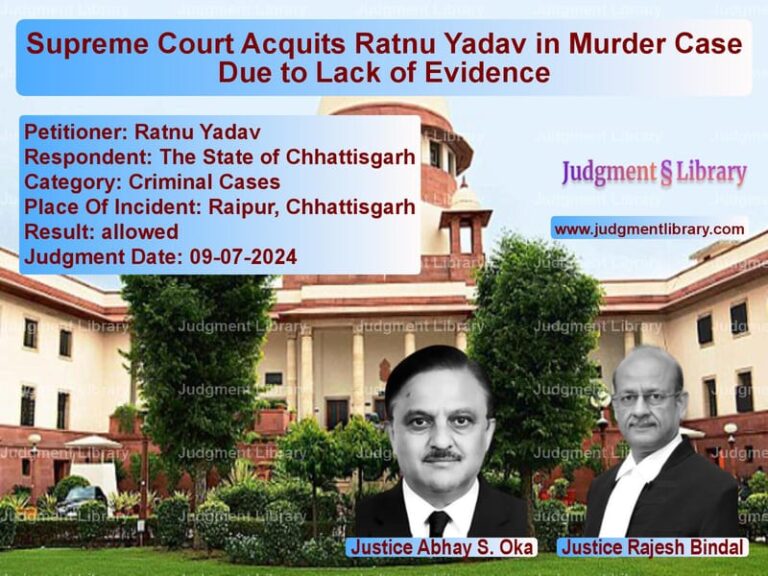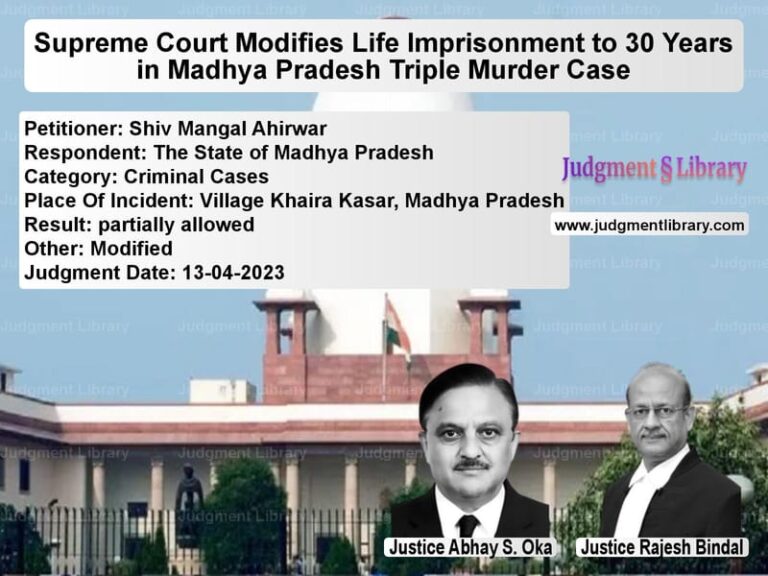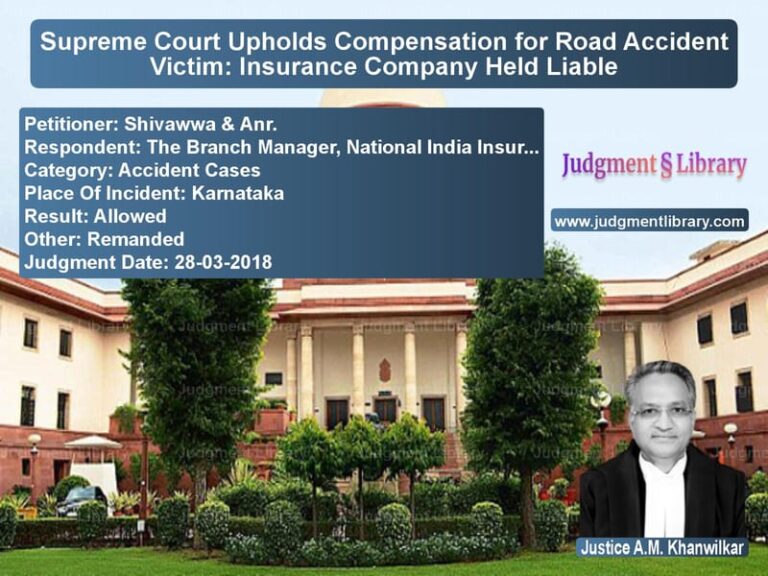Supreme Court Quashes Aurangabad Municipal Corporation’s Reversion Order in Town Planner Dispute
On November 21, 2019, the Supreme Court of India delivered a crucial judgment in the case of Aurangabad Municipal Corporation vs. Jayant Sarvottamrao Kharwadkar & Others. The ruling addressed a dispute over the reversion of a Town Planner, holding that the order of reversion issued by the Municipal Commissioner was in violation of principles of natural justice. The Supreme Court quashed the reversion order and directed the municipal authorities to take further steps in accordance with law.
Background of the Case
The case revolved around the appointment and promotion of Jayant S. Kharwadkar, who was appointed as a Junior Engineer in the Engineering Department of the Aurangabad Municipal Corporation on July 27, 1985. Over the years, he was transferred between departments, including a temporary posting as a Planning Assistant in the Town Planning Department in 1988. Subsequently, he was promoted to the position of Town Planner on June 29, 1998.
The dispute began when the Municipal Commissioner, by an order dated August 28, 2002, reverted Kharwadkar to the post of Sectional Engineer. The reversion order was purportedly based on the judgment in an unrelated writ petition (WP No. 2156/1988) that had dealt with promotions in the Engineering Department.
The reversion order was challenged before the Bombay High Court, which initially dismissed Kharwadkar’s petition on September 29, 2003. However, upon review, the High Court allowed the petition on October 20, 2012, and reinstated Kharwadkar’s position. The Municipal Corporation appealed this decision before the Supreme Court.
Key Legal Issues
The Supreme Court examined two fundamental legal questions:
- Whether the reversion order issued by the Municipal Commissioner violated principles of natural justice.
- Whether the High Court was justified in reviewing and overturning its earlier decision.
Arguments of the Appellant (Aurangabad Municipal Corporation)
The Corporation contended that:
- The reversion order was a necessary administrative decision following the High Court’s ruling in WP No. 2156/1988, which had directed the Corporation to reconsider promotions.
- Kharwadkar was improperly placed in the Town Planning Department and was not entitled to the post of Town Planner.
- The High Court’s decision in review was erroneous, as the original dismissal of the writ petition was correct.
Arguments of the Respondent (Jayant S. Kharwadkar)
Kharwadkar argued that:
- His appointment in the Town Planning Department was legitimate, and he had been serving in that role for over a decade before the reversion order.
- The Municipal Commissioner’s order was passed without issuing a show-cause notice or giving him an opportunity to be heard.
- The High Court’s review decision was correct, as the original judgment failed to consider his long-standing service and the procedural impropriety in his reversion.
Supreme Court’s Observations
The Supreme Court carefully examined the procedural aspects of the case and made the following key observations:
1. Violation of Principles of Natural Justice
The Court ruled that Kharwadkar’s reversion order was issued without affording him an opportunity to be heard. It stated:
“Reversion of an employee is a matter of substantive prejudice. Hence, there can be no gainsaying the fact that an opportunity of being heard is required to be afforded before an order of reversion is passed.”
2. Inconsistency in Municipal Commissioner’s Orders
The Supreme Court highlighted that the Municipal Commissioner had initially issued an order on August 27, 2002, recognizing Kharwadkar’s placement in the Town Planning Department as legitimate. However, the very next day, an order of reversion was issued, contradicting the earlier stance. The Court found this inconsistency problematic.
3. No Connection to WP No. 2156/1988
The Court clarified that the High Court’s decision in WP No. 2156/1988, which directed a reconsideration of promotions in the Engineering Department, had no bearing on Kharwadkar’s service in the Town Planning Department. It stated:
“The proceedings before the High Court in Writ Petition No. 2156/1988 had no relevance to the appointment of the first respondent to the Town Planning Department nor was his promotion as Town Planner in issue.”
4. Justification for the High Court’s Review Decision
The Supreme Court upheld the High Court’s review ruling, stating that since the earlier decision failed to account for procedural lapses in Kharwadkar’s reversion, the review was justified.
Final Judgment
The Supreme Court ruled:
“The order of reversion dated August 28, 2002, was passed in manifest violation of principles of natural justice and is hereby quashed.”
Accordingly, the Court:
- Allowed the appeal to the extent of setting aside the reversion order.
- Directed the Municipal Corporation to take further action in accordance with law, if required.
- Set a timeline for any further proceedings to avoid prolonged uncertainty.
Legal Implications of the Judgment
This ruling reinforces several key principles in administrative law:
- Natural justice is paramount: Employees must be given an opportunity to be heard before adverse action is taken.
- Inconsistent administrative orders can be challenged: Conflicting decisions by public authorities can be set aside if they lack justification.
- High Courts can review earlier judgments: If an earlier decision overlooks key procedural flaws, a review petition can be entertained.
- Limited judicial intervention in service matters: Courts will intervene only when procedural violations are evident.
Conclusion
The Supreme Court’s decision in Aurangabad Municipal Corporation vs. Jayant S. Kharwadkar underscores the necessity of following due process in government service matters. By quashing the reversion order on the grounds of procedural impropriety, the ruling serves as a reminder that administrative actions must adhere to the principles of natural justice. This judgment sets a strong precedent for future cases involving arbitrary service reversion orders.
Petitioner Name: Aurangabad Municipal Corporation.Respondent Name: Jayant S. Kharwadkar & Others.Judgment By: Justice D.Y. Chandrachud, Justice Ajay Rastogi.Place Of Incident: Aurangabad, Maharashtra.Judgment Date: 21-11-2019.
Don’t miss out on the full details! Download the complete judgment in PDF format below and gain valuable insights instantly!
Download Judgment: Aurangabad Municipal vs Jayant S. Kharwadkar Supreme Court of India Judgment Dated 21-11-2019.pdf
Direct Downlaod Judgment: Direct downlaod this Judgment
See all petitions in Employment Disputes
See all petitions in Promotion Cases
See all petitions in Public Sector Employees
See all petitions in Judgment by Dhananjaya Y Chandrachud
See all petitions in Judgment by Ajay Rastogi
See all petitions in allowed
See all petitions in Quashed
See all petitions in supreme court of India judgments November 2019
See all petitions in 2019 judgments
See all posts in Service Matters Category
See all allowed petitions in Service Matters Category
See all Dismissed petitions in Service Matters Category
See all partially allowed petitions in Service Matters Category







